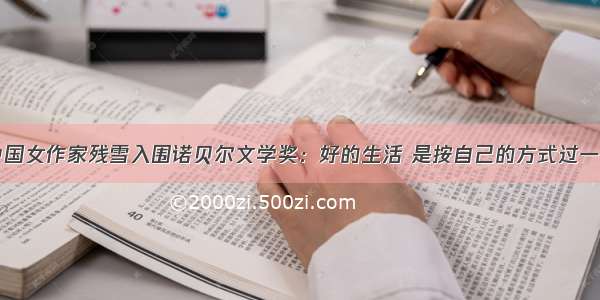
诺贝尔文学奖赔率榜,
中国作家残雪上榜,高居第三位,
成为大冷门。
▼
残雪,这个名字在中国并不出名,大家提及更多的是她哥哥——邓晓芒,康德“三大批判”的翻译者,中国最著名的哲学教授之一。
但在世界文坛,残雪这个名字却并不小众。
残雪是作品在国外被翻译出版最多的中国作家之一,她的小说成为美国哈佛、康奈尔、哥伦比亚等世界名校的文学教材,是唯一获得美国最佳翻译图书奖的中国作家,和余华莫言王蒙等齐名。
残雪
残雪原名邓小华,1953 年生于长沙,是1980年代的先锋作家,至今已有六百万字作品,被美国和日本文学界认为是 20 世纪中叶以来中国文学最具创造性的作家之一。其代表作有《赤脚医生》《山上的小屋》《黄泥街》《苍老的浮云》《五香街》等。
为什么国外这么出名,但中国广大群众却很少听过她呢?
作为先锋派文学家,残雪的作品比较晦涩难懂,门槛较高,因此如果不是文学爱好者或是文学专业,很少有人会去读。
值得一提的是,小学毕业的残雪却有二十多年的英语自学经历,堪称励志。读着英文原著成长起来的她可以自己用英文写文章(曾发表至英国著名报纸《卫报》上),在小说翻译到国外时还可以自己做英文校对。
借此机会,小编节选了 Asymptote 上的特约编辑 Dylan Suher 与 Joan Hua 对残雪的一篇专访,带你了解这位“小众”的著名作家。采访中残雪探讨了自己作品的特质,中国文化对自己作品的影响,与英文译者的关系,与读者之间的联系,以及对中国当代文坛的看法。
“
采访者
Youve switched English translators over the course of your career: the first three collections of yours translated into English were done by Ronald R. Janssen and Jian Zhang, while the most recent three have been translated by Karen Gernant and Chen Zeping. What is your relationship with your translators like: is there a collaborative process? What skills and qualities are necessary, in your estimation, for someone to be able to translate a Can Xue story?
在您的写作经历当中,您曾换过几次英文翻译家:头三部翻译成英文的作品是由 Ronald R. Jansen 和 Jian Zhang 所译,而最近期的三部作品则是由 Karen Gernant 和 Chen Zeping 合作翻译的。请问您与译者的关系如何?其中是否存在合作空间?就您估计,什么样的技能及特质是成功地翻译一篇残雪故事所必须具备的?
残雪
Im friends with all my English translators. Altogether, I have five English translators: Ron Janssen and Jian Zhang (who translate collaboratively), Karen Gernant and Chen Zeping (who translate collaboratively), and Annelise [Finegan].
我同我的英文译者都是朋友。我一共有五个英文译者:Ron Jansen,张健(两人合译),Karen Gernant,陈泽平(两人合译),和 Annelise。
Starting in the 1990s, I put my all into studying English and managed to achieve a certain level of skill with the language. Ever since Karen and Chen Zeping took over translating my work, Ive insisted on reading their translations (and later, Annelises translations) and offering the translators my opinions.
从90年代起,我奋力学习英文,掌握了一定的技巧,从 Karen 和陈泽平接手我的作品翻译以来,我一直坚持阅读他们的译文(也包括后来 Annelise [Finegan] 的译文),给译者提供参考意见。
Can Xues works are truly exceptional; I feel that the most important skill my translators can have is to read the original intensively, thereby having a thorough grasp of the deep underlying humor and general feel of the language in my works. How precisely they express something in their translations is closely connected with their power to feel and their ability to grasp logic, because these kinds of fictions have already surpassed the profundity of philosophy.
残雪的作品是很特殊的,我认为最重要的技能是精读原文,对作品的整体语感和深层幽默有全面的把握。表达的精确性与译者的感受力、以及逻辑能力有直接关联。因为这样的小说已经超越了哲学的深度。
It is most difficult to properly convert one language into another. Within Chinese, meaning is buried deep, and the language emphasizes subtleties of feeling. English is more direct and emphasizes clear distinctions. Its really difficult to grasp that "degree" of translation.
两种语言的恰当转换是最难的。中文含义深,更重感觉的微妙,英文直接,更重辨别的清晰,这个"度"极难把握。
”
“
采访者
You expect a real partnership with your readers. You have said that they need to be well-read enough in modernism to understand your writing technique, and willing to make the effort to understand the deep structure of your work. Considering that you expect such a high level of engagement and response on the part of your readers, what is your personal relationship with your readers like? Do you notice a difference between the response of your Chinese readers to your work and the response of foreign readers to your work?
您期望与您的读者有个真正的合作关系。您曾说过这些读者必须具备扎实的现代主义底蕴方才能明了您的写作手法,并需肯下功夫去了解您作品当中深层的结构。倘若您对读者的投入和回应期待那么高,那么您个人与读者们的关系又是如何?对于您的作品的反应,您是否注意到华文读者和外文读者之间什么不同?
残雪
I often interact with my readers in China, and quite a few interviews with me have been published. And Im also on the Web, communicating with netizens. I also frequently critique my colleagues—Ive offended almost all my fellow writers and critics. However, I still must persist in speaking reason and I must maintain my critical position.
在大陆,我经常同读者互动,出版过好几本访谈录。还在网上同网民交流。我也经常批判我的同行,几乎将所有作家和批评家都得罪了。不过我仍要坚持说理,坚持批判立场。
China has more than a few Can Xue fans, but overall, Can Xues era still hasn arrived, because her works are too ahead of the curve, and don conform to commonplace, habitual aesthetics. So I must continue to do the steady work of bringing my writings into existence. Chinese readers and foreign readers should have about the same reaction to my writing. Because my subject matter is universal human nature—the original face of nature.
大陆有不少残雪迷,不过总的说来残雪的时代还没到来,因为她的作品太超前了,不符合一般审美习惯。所以我要继续扎实工作,让自己的作品存在。对我的作品的反应,华文读者和外文读者应该差不多。因为我的主题是普遍人性,是大自然的本来面貌。
”
“
采访者
Your writing often depicts grotesqueries, bodily disfigurement, and outright violence. This is a quality it seems to share with works by other writers identified with Chinas avant-garde school of the 1980s. Specifically, the imagery in some ways resembles the early works of Yu Hua, which you have called "the first Chinese works that can truly be said to belong to modernism and to have substance." How does your approach to writing about violence compare with the approach taken by the other avant-garde writers and how do you yourself feel about depicting violence in your work?
您的著作经常描写古怪奇醜、肢体残毁、及全然的暴力。这一项特色似乎近似于其他80年代所谓先锋派作家们的作品。尤其您作品的意象某种程度上仿若余华早期的著作,即您曾称是"中国真正称得上现代主义而又有内涵的作品"。您描写暴力的手法和其他先锋作家有什么异同之处、能否说说您自己对于您作品中暴力描写的看法?
残雪
Writing violence for the sake of violence is vulgar and tasteless. I am not like some Chinese writers, who get a thrill from the simple depiction of violence. Thats called acting out a perversion; theres no substance to it.
为暴力而写暴力是没有品位的。我并不像有的中国作家,对单纯的暴力描写感到津津有味。那叫做变态,没有内涵。
In a select few of Yu Huas early works, he writes violence in a very remarkable manner, for example, the works in his collection Mistakes by the Riverside. I even wrote a review of that collection. But he has several stories where he writes violence and there is no substance to it. His self-awareness when creating is not strong. A few of Mo Yans depictions of violence are really warped, of low character.
余华早期的某些作品写暴力很出色,例如《河边的错误》等。我还写过评论。但他也有几个写暴力的作品并无内涵。他的创作上的自我意识不强。莫言的一些暴力描写很变态,品位不高。
What does it mean to say something has substance? It is to say: your depictions of violence must have form, must have a sense of metaphysics to them. Just like the images in Dantes hell, they must depict the true struggles deep within the soul. Readers read the terrifying images in Dante, but those images push those readers to yearn for their purest ideals. Your question lumps my writing together with other writers of the eighties, which shows that you haven entered deeply into Can Xues works—you need to put more effort into reading!
什么叫有内涵?就是说你的暴力描写要有形而上学的意味,它是对灵魂内部真实斗争的描绘,就如但丁的地狱图像。读者读到了可怕的景象,但这些景象激起了他对最纯净的理想的向往。你的问题将我的作品同其他80年代作家一锅烩,说明你们对残雪的阅读并未深入下去,还要努力。
”
“
采访者
You have famously described your work as a "foreign plant growing in the soil of five thousand years of history." You often talk about the "foreign plant" but only very seldom discuss the "soil of five thousand years of history." What are your Chinese influences? "Tales of the strange?" Perhaps the poetry of Li He or Li Shangyin? How does the "soil of five thousand years of history" nourish your work?You have famously described your work as a "foreign plant growing in the soil of five thousand years of history." You often talk about the "foreign plant" but only very seldom discuss the "soil of five thousand years of history." What are your Chinese influences? "Tales of the strange?" Perhaps the poetry of Li He or Li Shangyin? How does the "soil of five thousand years of history" nourish your work?
您曾称您的作品是"异国的植物生长在有五千年历史的身后的土壤之中"。您常提到这"异国的植物",却鲜少论及"五千年历史的身后的土壤"。您的作品是否承袭了什么中国文化的影响?志怪小说?或许李贺或李商隐的诗词?"五千年历史的身后的土壤"如何滋养您的写作?
残雪
We must first clarify this idea—what is Chinese culture? The food we eat, the clothes we wear, the way we interact with each other, romantic relationships, sense of languages, ways of speaking—do these belong to culture? Are we immersed in 5000 years of culture? As a purely modernist artist, would I have more profound, more deeply felt feelings toward Chinese culture than the ordinary person?
首先要弄清一个概念,什么是中国文化?吃饭穿衣,与人打交道,男女关系,对语言的感觉,说话的方式等等,这些是不是文化?我们是不是浸淫在五千年的文化之中?作为一名纯粹的现代艺术家,对这个中国文化的感受会不会比一般人更深、更彻骨?
I have read some of the pieces of Chinese literature that you mentioned; nevertheless, with the exception of Dream of the Red Chamber and some Tang poetry, the others cannot touch my soul. The essence of Chinese culture that I contemplate is the potential force of ideas like "the unity of heaven and man." In the past 5000 years, our people have not been conscious of this power, because we have been isolated and closed to the world, and we lack a spirit of independence.
你说的那些中国文学作品我虽然也读过一些,但除了《红楼梦》和一些唐诗以外,其他的并不能触及到我的灵魂。我所思考到的中国文化的精髓,是她那种"天人合一"的潜在力量。这种力量在五千年里头并没有被我们民族意识到,因为我们孤独封闭,缺少独立精神。
Yet we are supposed to have this power—an ethnic group that has existed for thousands of years must possess some eternal elements. If you don develop these elements, however, then they will forever remain in darkness and never see the light of day, which also means they will never be able to truly exist.
但我们应该是有力量的,一个民族存在了几千年,里面总会有一些不朽的元素。但这些元素你不去开发,它们就永远在黑暗深处不见天日,也不能真正存在。
My method is to use Western culture as a hoe to unearth our ancient culture, so we can realize its proper value. Western culture has been "divided" for thousands of years. I want to now join the two shores—earth and sky, the material and the immaterial—and combine them into one. And for that task, I have some advantages: namely, the nourishment and enlightenment I receive from 5000 years of history.
我的方法,就是用西方文化的这把锄头来开掘我们的古老文化,使它应有的价值得以实现。西方文化"分"了几千年,我现在要将此岸与彼岸,大地与天空,世俗与虚无合成一个东西。而在这方面我是有优势的,这个优势就是五千年历史给我的滋养,启示。
”
“
采访者
Youve had a very long writing career—youve been writing for more than thirty years, a period in which China has changed dramatically, and the market for writing in China has almost completely transformed. And yet, your writing style seems to remain remarkably consistent. How do you yourself feel your writing (or your writing process) has changed over the past thirty years?
您如今写作已经很长一段时日,恐怕有超过三十年了。这期间中国经过了极大的改变,而中国的写作市场亦几乎天翻地覆地转型。尽管如此,您的写作却似乎长久保持着一定的风格。您自认您的写作(或写作过程)在过去三十年之中如何演变了?
残雪
The small changes within Chinese literary circles in the past few decades can hold no significance within the several thousand years of literary history; these changes have had absolutely no influence on my writing. My writing shifts gradually. What it obeys are the laws inherent in my creative process—an evolution, a gradual, continuous revealing of new life. I whole-heartedly detest writing to follow the crowd; I have always been incompatible with the Chinese literary world.
中国文坛这几十年的小小变化在几千年的文学史中并不能占据重要位置,它的变化对我的写作毫无影响。我的写作是徐徐变化的,它遵循的是我的创作本身的规律——一种新生命的逐步揭示与演变。我最讨厌跟风的写作,我一贯与中国文坛格格不入。
”
(中英文来源:Asymptote)
















